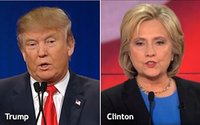 Email marketing was a powerful source of engagement and fund-raising for President Barack Obama’s re-election campaign in 2012, and now both Hillary Clinton and Donald
Trump are attempting to use the email channel to their respective campaigns’ advantage with mixed results.
Email marketing was a powerful source of engagement and fund-raising for President Barack Obama’s re-election campaign in 2012, and now both Hillary Clinton and Donald
Trump are attempting to use the email channel to their respective campaigns’ advantage with mixed results.
New research from user engagement platform Iterable points to differences
between the Democratic and Republican presidential candidates and their email marketing campaigns. Iterable signed up for both candidates, contributed $10 dollars to each campaign and then tracked the
politico's content marketing campaigns for three weeks.
Although the number of email messages sent by Trump's camp more than doubled during the past year, according to Iterable,
Clinton's camp continues to send far more emails. Just the series of "Welcome" emails sent numbers seven, according to Iterable’s study.
“There is some risk that they are overloading people with too many messages,” says David Rangel, vice
president of marketing at Iterable. “One way to deal with this might be to throttle messages based on engagement.”
For example, a subscriber who actively participates in the
campaign and clicks on emails would receive more messages than someone who is not engaged and should receive fewer messages.
Both candidates can improve is cross-channel coordination and
calls-to-action, according to Iterable, which analyzed the use of SMS, email and social media for both campaigns. The findings suggest neither candidate coordinates content very well across screens
and devices.
“Trump is super active on Twitter, so making that apparent in emails would lead to more engagement as people follow them across channels,” Rangel says.
“Gone are the days of isolated TV, direct mail and email marketing; today it’s essential to take cross-channel approach,” Kristin Naragon, director of email solutions at Adobe.
”Analyzing both online and offline behaviors of your target audience allows politicians to discern the unique characteristics of each demographic, or even down to individuals. The
value of data is in the ability for politicians to serve up content based on individuals’ preferred channel of communication.”